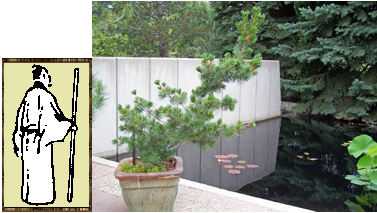
Hexagram Eleven—Tranquility
In a period of relative prosperity one rejoices in life and deals with the routine problems of living. It is not time to launch an attack; aggression would bring ruin.
The first line, yang, shows that pulling up a clump of grass brings with it other stalks that are connected by the roots. The image signifies that one action accomplishes unexpected results and leads to further projects.
The second line, yang, shows one who is tolerant, generous, and balanced. This person is acting in harmony with the Dao.
The third line, yang, means that despite life's inevitable changes and distress, a firm and steady attitude ensures success.
The fourth line, yin, shows weakness. Rather than developing one's own strength, one looks to others who cannot always help.
The fifth line, yin, shows a king celebrating the marriage of his younger sister. There is great auspiciousness in generous, right action.
The sixth line, yin, shows an unfortunate mood of retaliation. It is not the time to attack enemies, but to tolerate. Aggressive action will cause regret.
Hexagram Eleven Commentary
Hexagram Eleven offers advice for the times when things are already moving in a positive direction. The introduction says this is a time to rejoice, not to attack other people or start fights.
The first line, yang, shows clumps of grass growing in the water, connected at the roots. When things are going well, the subject's actions will lead to further inspiration and good connections. The metaphor is of pulling up a clump of grass and bringing other stalks and roots with it.
The second line, yang, shows a strong person living through a season of tranquility, who goes with the flow. This person knows how to be happy.
The third line, yang, confirms the value of a good attitude when times are good. It says, "a firm and steady attitude ensures success."
The fourth line, yin, shows a person who is unable to accept the good in a situation, who complains to others and expects other people to carry them, even when times are good. This shows a lack of inner strength, something other people cannot provide.
The fifth line, yin, shows a good king celebrating the marriage of his younger sister. The king personifies the attitude of generosity and finding joy in other people's good fortune.
When times are good, it's best to focus on what's working. Life will still present routine problems to solve, but getting angry and attacking others over the small stuff is a big mistake. According to the sixth line, yin, "it is not the time to attack enemies, but to tolerate. Aggressive action will cause regret.
To the reader: Most of the hexagrams have at least one line that predicts bad results, but that does NOT mean you are fated to that result. The hexagrams illustrate different attitudes, so study the actions and reactions to learn the attitudes that will lead to better outcomes.
The I Ching teaches you to flow with changes and create positive change from the inside through conscious living. Your future is in your hands. Consult the I Ching for ideas that lead to clear thinking and positive mental attitude. Reading the I Ching helps you take the time to reflect on your attitudes and ideas. Continue asking until you feel positive about your course.

Click here for another hexagram.
A note about this interpretation of the I Ching: Nori Muster wrote this version of the I Ching in 1994 and put it online at Surrealist.org in 2000. It is also available at Amazon:
e-book
paperback
